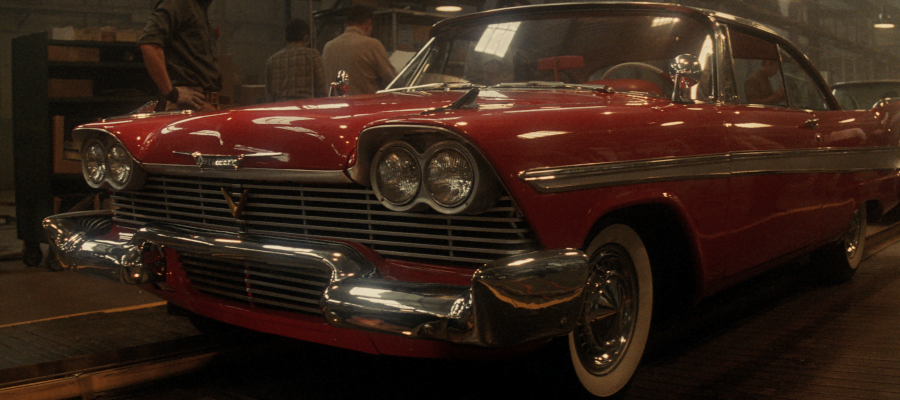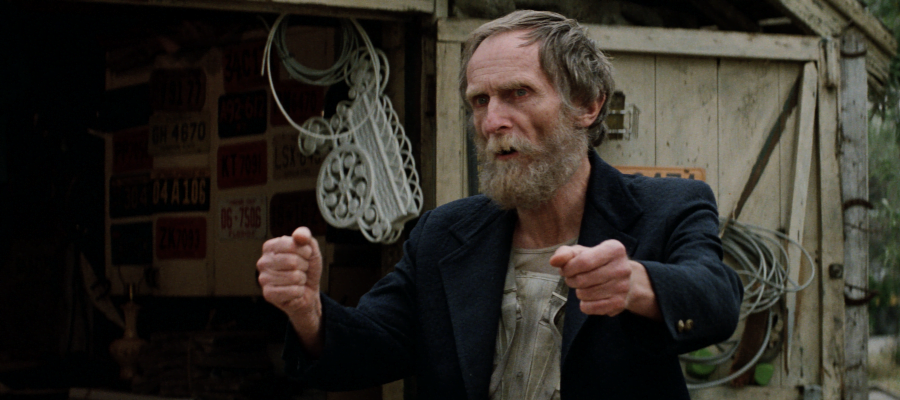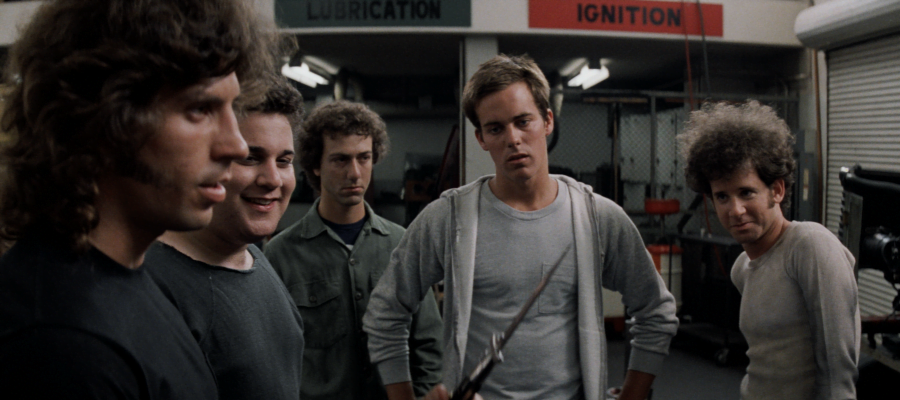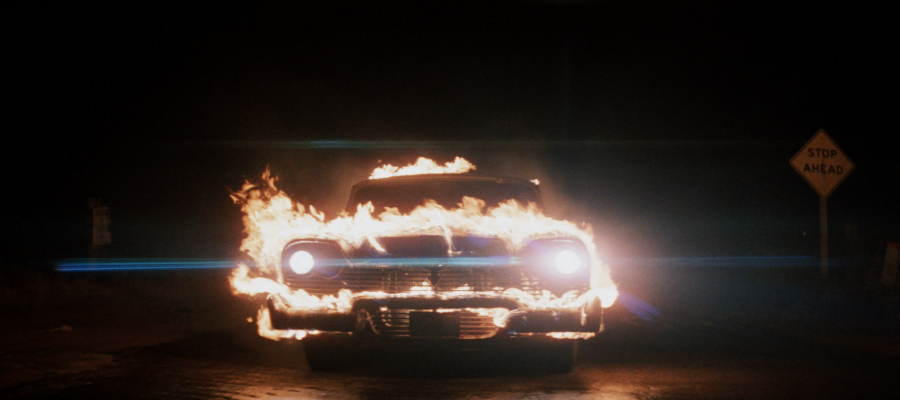Christine is a 1983 horror novel and movie about Stephen King’s ongoing fascination with What If A Thing Was Evil. Having done clowns and spiders and dogs and being alone with your wife, Christine wants to bring this powerful critical tool to bear on the question of What if A Car Was Evil? Would That Be Fucked Up Or What?
Set in the 1970s the story –
The story –
Look I’m going to spoil some things, so like, spoiler warning.

The story of Christine is— that is, Christine the movie — simple. There is this car, you see, and it’s evil. In a series of completely unsurprising events, where nothing transpires that should surprise you, a character acquires this evil car, and the car starts doing evil things. The sequence of events is that a character who is bullied acquires the car, then becomes focused on the car, then the car starts killing people. The car’s owner is confronted, decides they’re okay with it, the car is stopped by their friends, and in the process, the owner dies.
Christine as a story is, essentially, a Simpsons Treehouse of Horror segment. If you’re used to horror media being built around an elaborate twist or some deep insight, it isn’t that kind of thing and I don’t think it’s ever trying to be. This isn’t about why or how a car could be an evil car, but much more about the very tangible question of ‘what if there was an evil car.’
It isn’t like I wasn’t having fun watching this movie. It wasn’t even that I was expecting there to be more to it. It’s only when I was reconstructing the movie’s timeline for this writeup that I realised how simple a story the movie is. If there’s a twist anywhere in it, it’s out of expectations I don’t have because I’m used to the way this kind of story is structured. Behold, a nerd, and that nerd is isolated, and responds by falling into something dangerous, and that something dangerous will destroy him, except along the way it will also destroy a lot of other people who suck as well.

I don’t know if I just don’t get Stephen King’s work, really. I don’t know if Christine really counts as being a Stephen King movie of course; he wrote the book, but as with all movies-of-books, there’s layers of interpretation. That’s where the ideas that seem missing in the movie get explored. In the story presented in this movie, I think it’s trying to draw you along the line of the nerd’s experience. You start out oppresed, then presented with a thing that changes that, focus on the change, try something different and then the change makes your life better by defending you from violence (through violence!).
The story takes you a place you probably want to go (where the very bad people in his life are punished) and then goes even further (where his friends are injured). I didn’t find this particularly relatable, because this nerd has a pretty understandable sucky experience of high school and is surrounded by people telling him to change or improve when he’s… like… seventeen. He’s enduring one of the least fun parts of his life and nobody’s defending him from the bullying by people with knives who should… and then the story escalates, through the narrative device of a haunted evil magic car.
I’m led to understand that in the book, Christine (the car) is haunted by the ghost of the previous owner, and this ghost seems to possess our nerdy protagonist. Christine is still a mystery, but the previous owner is more of a cultist engaging with the cursed car. That’s not part of the movie, though — in fact it kind of doesn’t work with the movie, because the role of that character isn’t in the movie. That role is instead handed to his brother — the brother who is also responsible for the same lines of dialogue that nerd winds up quoting, invoking the idea that he’s somehow becoming like that owner, don’t come from that owner.

It reminds me a lot of, and I swear I’m not messing with you, Biblical Harmonisation.
If you engage much with Biblical apologetics, which is the social practice of publically making up excuses for flaws in a human made text, you’ll encounter a common trend in how criticisms are restructured. When you present a series of contradictions in the text, like where one character is said to do something and in a different book that same thing is done by another character, you’ll often get a response that involves constructing a fictional thread of narrative that can make the two different accounts compatible.
It doesn’t matter how unlikely that thread is — what matters is that there is a way that the story can be reconstructed so that these two incompatible texts secretly do work together. The book of Christine includes things and the movie of Christine includes different things, and hypothetically you can use them to inform one another. I don’t want to, though — what the movie leaves unstated means we don’t have to deal with an extensive exchange with a racist grandpa, and there’s less of a focus on things like the importance of the military.
Instead, the story as presented is about an evil car.

Make no mistake: Christine is, as a movie, entirely worth the time I spent watching it just for the sequence of watching the damaged car repair itself. It’s great. There’s a greatness to the kills too, an excessive glory in how the movie treats the space around the car, and the sensuality of the material object that is Christine. Things like the use of the radio to communicate messages – threatening or otherwise – is a really cool touch. Christine is the character that drives the story and she’s really excellently played by a series of props.
I like this movie.
I also think it’s kinda got that fascist death cult thing going on that’s fundamental to a lot of Americana of the era. The Nerd never changes his ways from his devotion to Christine. He embraces the violence, the object, the change to himself, and reaches out for Christine as he – and it -dies, and the story treats his death as tragic. It’s a glorious death in its own way, where yes, he died, but thanks to him and his devotion to Christine, the bullies that hurt him and also a few people including a cop, are all dead.
The fantasy of a bullied nerd embracing evil power to finally get rid of the bullies is a pretty common one. It’s a very American story. It’s a story that’s mirrored in how they talk about school shootings. It’s a fantasy that there are problems and solutions that can’t really be addressed, but wouldn’t it be nice if they were. Shame there’s no way to consider it, or fix it, or address it.
Car’s just evil, you see.
1 Comment
@updates @Talen_Lee I've seen this movie a couple of times now and the thing that sticks with me, the thing I think *works* in a way that feels both unusual and well done, is how making Dennis our focal character also makes it a movie about the experience of watching your friend (who you love and possibly are in love with?) transform in ways you don't understand into someone you don't like and who scares you, and the confusion, pain and fear that accompanies that process.